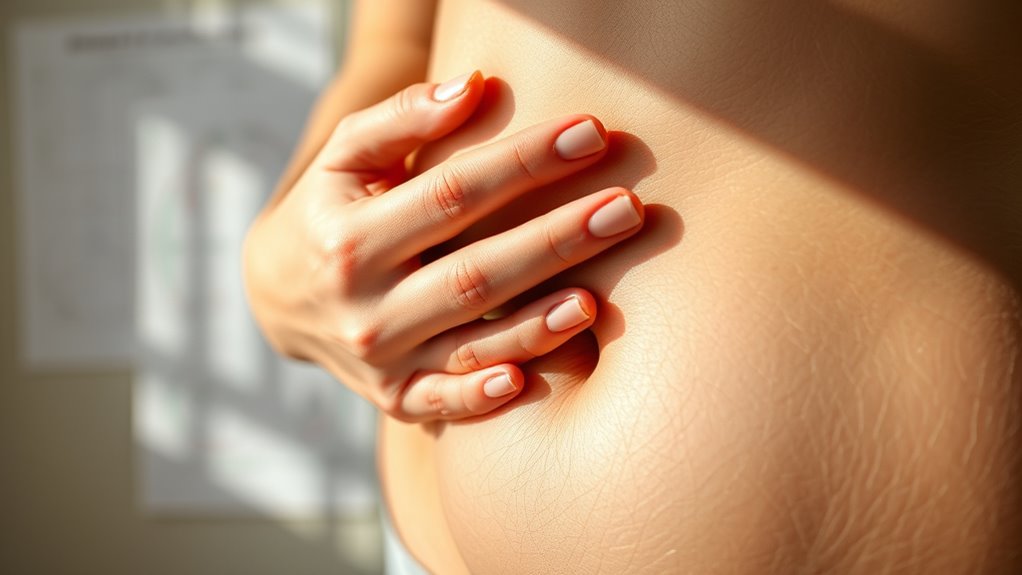Many myths about post-birth control fertility are unfounded. Most reversible methods, like pills or IUDs, don’t cause long-term fertility problems, and your cycle usually returns within a few months. Fertility isn’t permanently impacted, and factors like age and health matter more. While some methods may delay your return to fertility temporarily, you’re likely to conceive naturally soon after stopping. To understand what to expect and how your body recovers, explore the facts further.
Key Takeaways
- Most birth control methods are reversible, and fertility typically returns soon after stopping.
- Long-term use of hormonal contraceptives does not cause permanent infertility.
- Fertility delays post-birth control are common and usually resolve within months as hormones rebalance.
- Natural Family Planning can be highly effective and is hormone-free, offering greater control over fertility.
- Age and overall health have a more significant impact on fertility than prior use of birth control.
Menstrual Cycles Return Immediately After Discontinuing Birth Control

Many women expect their periods to return immediately after stopping birth control, but this isn’t always the case. Your body needs time to adjust once you stop taking hormonal pills or other forms of contraception. It can take anywhere from a few days to several months for your cycle to normalize. Factors like the type of birth control you used, your overall health, and how long you’ve been on it influence this timeline. Some women experience a temporary delay or irregularity as your hormones rebalance. Don’t be concerned if your period doesn’t come right away; your body needs time to reset. Additionally, hormonal adjustment varies from person to person and can be affected by lifestyle factors. Keep tracking your cycle, and remember, every woman’s recovery process is unique.
Birth Control Effects Permanently Reduce Fertility

There’s a common misconception that using birth control causes permanent damage to your fertility. In reality, this isn’t true. Most hormonal methods, like pills, patches, or IUDs, temporarily suppress ovulation, but once you stop using them, your fertility typically returns to normal within a few months. Your reproductive system isn’t permanently altered by these methods; they’re designed to be reversible. Studies show that long-term use doesn’t reduce your chances of conceiving later. If anything, birth control can help you better understand your cycle and plan pregnancies more effectively. Additionally, hormonal methods are safe and effective for most women without long-term adverse effects. So, you don’t need to worry that stopping birth control will damage your ability to have children in the future. Your fertility remains intact and ready when you are.
Contraceptive Pills Cause Long-Term Infertility

Contraceptive pills do not cause long-term infertility, despite common fears. When you stop taking the pill, your fertility typically returns quickly, often within a month or two. Studies show that hormonal contraception temporarily suppresses ovulation, but this effect is reversible. Your reproductive system isn’t damaged or permanently altered by the pill. In fact, many women conceive without difficulty after stopping. Concerns about lingering infertility are unfounded; any delays in conception are usually due to age or other health factors, not birth control. Medical research confirms that fertility resumes normally once hormonal contraception is discontinued. So, if you choose to stop, rest assured that your chances of conceiving remain unaffected in the long run.
Natural Family Planning Is More Effective Than Birth Control Pills
Natural Family Planning (NFP) can be more effective than birth control pills when used correctly, because it relies on tracking your own fertility signs rather than hormones or devices. When you understand your cycle, your chances of pregnancy or avoiding it become more predictable and within your control. Unlike pills, which can have side effects and may not be 100% effective if missed, NFP has a typical effectiveness rate of about 99% with proper use. Automation technology in fertility monitoring devices is advancing, making NFP more accessible and precise. Here’s why NFP stands out: 1. No hormones or chemicals—it’s natural and hormone-free. 2. Empowerment—you learn about your body’s rhythms. 3. Cost-effective—no ongoing expenses for devices or medications.
Hormonal Methods Delay Pregnancy for Years After Stopping

Hormonal methods like birth control pills, patches, and injections can profoundly delay your ability to conceive even after you stop using them. These methods work by suppressing ovulation, and it can take time for your body’s natural cycle to reestablish itself. In some cases, fertility may be delayed for months or even years, especially if you’ve used hormonal contraception for a long period. Your body needs time to reset hormone levels and resume regular ovulation. This delay isn’t permanent, but it can cause confusion and frustration if you expect to conceive immediately after stopping. Keep in mind that each person’s recovery timeline varies based on individual health, age, and how long you used hormonal contraception. Proper medical guidance can help you understand when your fertility returns, especially considering hormonal effects on fertility. Patience and proper medical guidance can help you understand when your fertility returns.
IUDs Lead to Permanent Fertility Problems

Many people worry that using IUDs might cause lasting damage to their fertility, but research shows this isn’t the case. In fact, IUDs are safe and don’t affect your ability to conceive later. Here are three facts to contemplate:
- No permanent damage: Studies show that IUDs don’t harm your ovaries or reproductive organs long-term.
- Quick return to fertility: Most women can conceive as soon as the IUD is removed, often within a few months.
- Safe for various health conditions: IUDs are suitable for many women, including those with certain medical issues, without risking future fertility.
- The role of fathers in supporting women’s health choices is also vital in ensuring informed decisions about contraception.
Rest assured, choosing an IUD doesn’t mean sacrificing your future fertility.
All Birth Control Methods Have Similar Impact on Fertility

While different birth control methods vary in their design and usage, they generally have a similar impact on your future fertility. Most reversible methods, like pills, patches, rings, intrauterine devices, and implants, do not cause long-term fertility issues. Once you stop using them, your fertility typically returns to normal within a short period. Even methods like the copper IUD or hormonal options don’t damage your ability to conceive later. The myth that certain methods cause permanent infertility isn’t supported by scientific evidence. Instead, your fertility depends more on age and overall health. Using birth control responsibly doesn’t reduce your chances of getting pregnant when you’re ready. Rest assured, the variety of birth control options available won’t hinder your future ability to conceive. Additionally, understanding the role of transient effects on fertility can help reassure those concerned about temporary changes during or immediately after use.
Age Is the Only Factor That Affects Post-Birth Control Fertility

Although age plays a significant role in your fertility, it isn’t the only factor affecting your ability to conceive after stopping birth control. Several other elements influence how quickly you might get pregnant:
- Overall health: Conditions like PCOS or thyroid issues can impact your fertility regardless of age.
- Lifestyle choices: Smoking, alcohol, and stress can reduce fertility, even in your prime years.
- Timing and frequency of intercourse: Knowing your ovulation cycle increases your chances of conception post-birth control.
- Understanding fertility factors can help you better assess your reproductive health and optimize your chances of conception.
Frequently Asked Questions
Can Birth Control Side Effects Impact Future Pregnancy Chances?
The current question asks if birth control side effects can affect your future pregnancy chances. Generally, most side effects don’t impact your fertility long-term. Once you stop using birth control, your fertility usually returns to normal quickly. However, some women might experience temporary changes, like irregular periods, but these usually resolve on their own. If you have concerns, it’s best to talk to your healthcare provider for personalized advice.
Do Fertility Issues From Birth Control Vary by Age or Health?
It’s interesting how your age and overall health can influence fertility issues related to birth control. You might find it coincidental that younger women usually recover fertility faster after stopping, while older women or those with health concerns may take longer. Your body’s response varies, so your age and health status play significant roles in how birth control impacts your future fertility. Stay attentive to your body’s signals and consult your healthcare provider for personalized insights.
Are There Long-Term Health Risks Associated With Stopping Hormonal Contraceptives?
You might wonder if stopping hormonal contraceptives poses long-term health risks. Generally, most side effects subside within a few months after stopping, and there aren’t significant long-term dangers. However, some women experience temporary changes in mood or menstrual cycles. If you notice persistent symptoms or have underlying health concerns, it’s best to consult your healthcare provider to assure your health remains on track.
How Does Long-Term Contraceptive Use Influence Natural Conception?
Long-term contraceptive use doesn’t harm your ability to conceive naturally once you stop. When you cease hormonal birth control, your hormones usually rebalance quickly, often within a few months. Your fertility should return to normal, and you can conceive without lasting effects. If you experience delays, it’s wise to consult a healthcare provider, but in general, using contraception for years doesn’t negatively impact your future fertility.
Can Lifestyle Changes After Stopping Birth Control Improve Fertility?
Your fertility can skyrocket with simple lifestyle changes after stopping birth control. Eating a balanced diet, exercising regularly, reducing stress, and avoiding smoking or excessive alcohol can dramatically boost your chances of conception. These small but powerful adjustments might seem minor, but they can create a ripple effect, making your body more fertile and ready for pregnancy sooner than you imagined. Take charge now, and watch your chances grow!
Conclusion
Just like the phoenix rising from ashes, your fertility often rebounds quickly after stopping birth control. Don’t let myths shadow your hopes—your body’s natural rhythm is resilient. Remember the story of Pandora’s box? Once opened, it’s easy to believe more trouble follows. But in reality, your fertility is more like the sun—ready to shine again when the clouds clear. Trust in your body’s own story; it’s more powerful than any myth.









